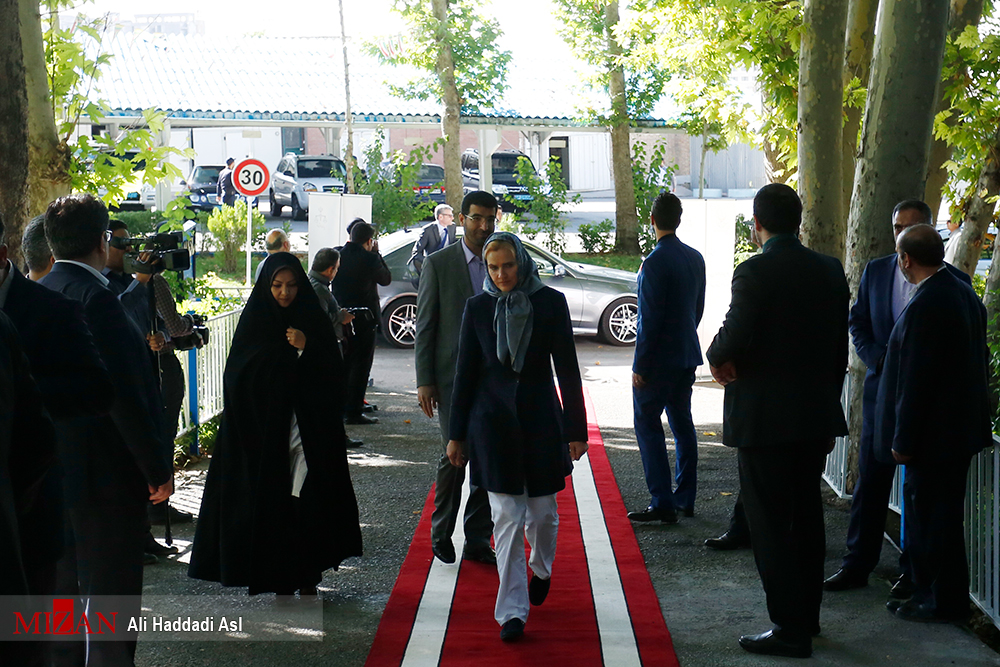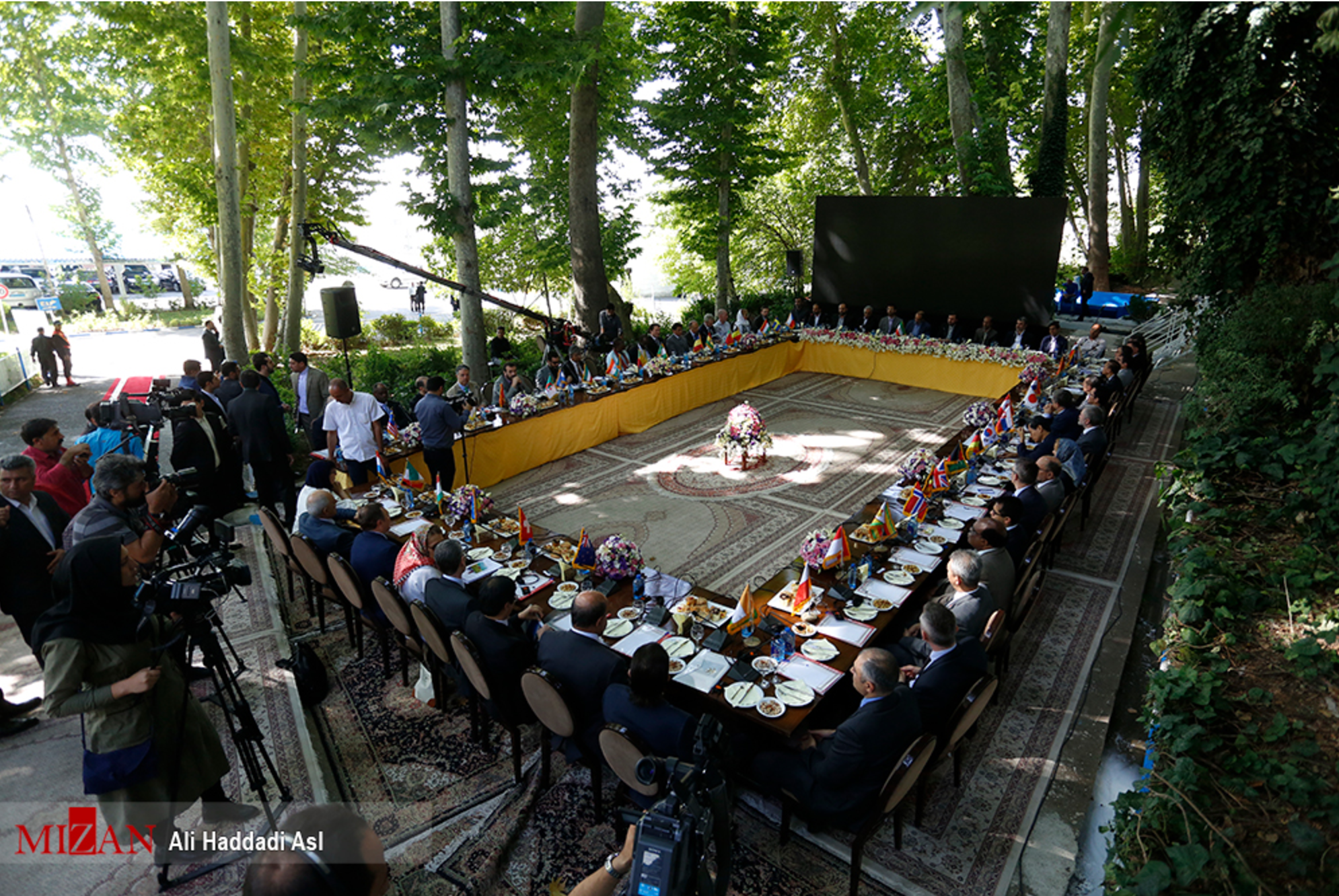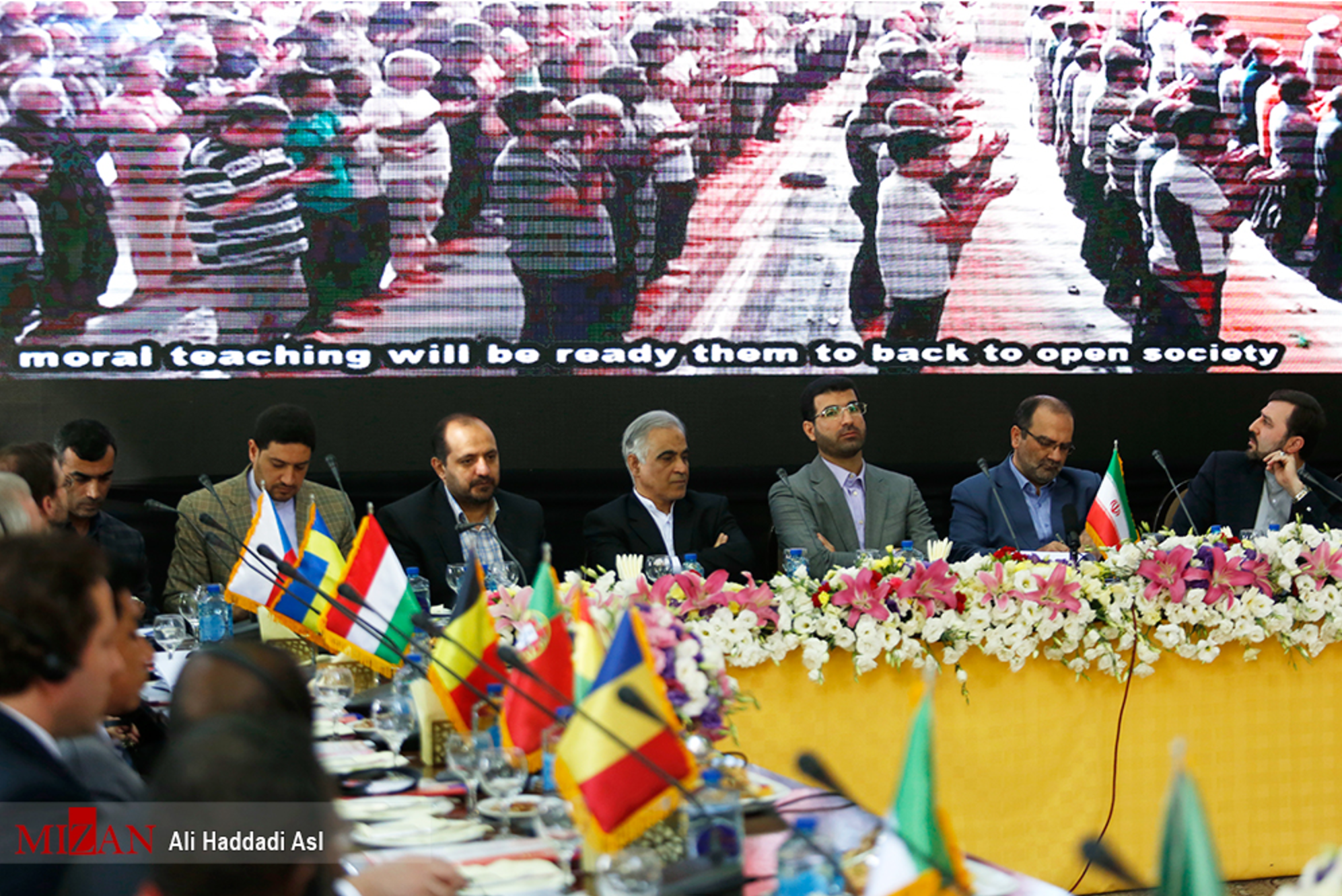CHRI – A member of the German embassy enters Evin Prison on a red carpet.Abusive Conditions and Political Prisoners Hidden from Visitors
A state-choreographed visit by dozens of foreign ambassadors based in Iran to Tehran’s Evin Prison has been condemned by prominent human rights activists inside and outside the country for glossing over the prison’s well–documented history of ongoing human rights violations.
 Guarded by state minders and preceded by a red carpet welcome, the visit on July 5, 2017 excluded certain areas of the prison, according to political prisoners currently held there. Envoys from participating countries including Great Britain, Germany, Japan and Denmark were, however, treated to a reception on the prison’s lawn.
Guarded by state minders and preceded by a red carpet welcome, the visit on July 5, 2017 excluded certain areas of the prison, according to political prisoners currently held there. Envoys from participating countries including Great Britain, Germany, Japan and Denmark were, however, treated to a reception on the prison’s lawn.
On July 7, Nobel Peace Prize laureate and lawyer Shirin Ebadi, who spent much of her life defending political prisoners in the Iranian court system, sent a letter to the UN special rapporteur for human rights in Iran, Asma Jahangir, describing how the wards were “pre-cleansed” to hide selected prisoners.
“On the day of the ambassadors’ visit, at least 20 political prisoners and financial convicts were transferred to Ward 2-A under the control of the Islamic Revolutionary Guard Corps (IRGC) and told they were going to be taken to court,” wrote Ebadi, a co-founder of the Defenders of Human Rights Center.
“Strangely enough, the esteemed ambassadors did not even visit the political wing of the Women’s Ward, where 24 political prisoners and prisoners of conscience are being held, including Narges Mohammadi, Nazanin Zaghari [Ratcliffe], Atena Daemi and Azita Rafizadeh, who I’m sure had a lot to share with the ambassadors.”
Two civil rights activists imprisoned in Evin also pointed out some of the places the ambassadors were prevented from viewing in another letter, a copy of which was obtained by the Center for Human Rights in Iran (CHRI).
“On Wednesday, July 5, 2017, we heard that a group of 45 ambassadors were visiting Evin Prison upon invitation from the Prisons Organization and the judiciary’s Islamic Human Rights division,” wrote Atena Daemi and Golrokh Iraee in a joint letter on July 8.
“Did they give you a tour of Ward 209, Ward 2-A or Ward 241? Did they show you the solitary cells without windows, ventilation or toilets? What about the cells known as the ‘graves?'” asked the political prisoners.
Ward 2-A is under the control of the IRGC, the Intelligence Ministry controls Ward 209, and Ward 241 is run by the judiciary’s intelligence branch.
The letter continued: “Did they inform you of the existence of Ward 350, where male political prisoners are held? Or the ward that is exclusively for convicted clerics? Did they tell you about prisoners such as Mohammad Ali Taheri, who has been in solitary confinement for more than five years in IRGC’s Ward 2-A?”
Ward 350 is also used to hold political prisoners, but is controlled by any specific security or intelligence organization.
“Did they introduce you to a physician with the alias ‘Shahriari?'” said the letter. “He’s the one who finds out what’s wrong with sick prisoners just by looking at them. He’s the one who never dares to sign his name because he’s afraid one day he will be exposed for his malpractice.”
“When we invite guests to our home, we obviously try to make a beautiful presentation, even if it’s the same place where [thousands of] political prisoners were executed in the 1980s,” added the letter.
An estimated 4,500-5,000 political prisoners who had already been tried and sentenced—mostly members of political opposition groups—were suddenly executed in prisons throughout Iran including Evin during the summer of 1988 without being provided access to due process.
Political prisoners in Iran, including elderly inmates, are singled out for harsh treatment, which often includes denial of medical care. The threat of withheld medical care has also been used as an intimidation tool against prisoners who have challenged the authorities or filed complaints.
In 2016, political prisoner Omid Kokabee was diagnosed with advanced kidney cancer after years of repeatedly being denied treatment for his symptoms.
Since 2005, no United Nations or other international monitoring body has been allowed to visit Evin Prison.
The deputy secretary general of the judiciary’s Islamic human rights division, Kazem Gharibabadi, described the visit by “about 50” ambassadors as an opportunity “to show that we consider prisons to be like universities.”
“Some Western countries and media have made unfounded and false accusations regarding human rights because they are particularly biased against the Islamic Republic of Iran,” he added. “Part of those accusations have regarded conditions in our prisons.”

Foreign ambassadors attend a reception outside Evin Prison in front of a big-screen TV used by officials to show footage of the prisoners.
Media Coverage
Iranian state and right-wing media presented the ambassadors’ visit as a vindication of Iranian officials’ repeated claims that the well-documented reports of rights violations in the prison are false.
Mizan, the judiciary’s official news agency, responded to the letter by Ebadi, Iran’s first female judge, on July 11 accusing her of “making things up” and supporting armed opposition groups, as well as the terrorist organization, ISIS.
The state TV and radio broadcasting agency, the Islamic Republic of Iran Broadcasting (IRIB), which has routinely filmed and broadcast forced confessions by detainees, meanwhile played interviews of some diplomats describing the areas they were shown as “good” while adding that they had no experience in foreign prisons or that they were new to the country.
“I have been in Tehran for six months and my information about the country is not complete, but today during this visit I had the opportunity to become informed about the conditions in this prison,” said Joao Corte Real, the Portuguese ambassador to Tehran.
“It is a good model. I was very amazed. It was very interesting to me. I think the conditions in the prison are really very good,” he added.
Kim Seung-Ho, the South Korean ambassador to Tehran, said: “I have not seen prisons in other countries, but what was very interesting for me was that the prisoners here did not have uniforms. They had no nametags and their cell doors are not closed. In South Korea, prisoners have uniforms and every six to 10 prisoners are kept in cells behind closed doors.”
The areas the envoy were allowed to visit were not disclosed. Overcrowding has resulted in some prisoners being crammed together into open rooms rather than single cells, with some inmates without access to beds forced to sleep on the floor.
In 2007, the head of the Tehran Province Prisons Organization, Sohrab Soleynami, said that Evin Prison’s official capacity is 1,000 prisoners, but 5,300 prisoners were being held there at the time.
Some far-right media outlets meanwhile described Evin Prison like a community center where prisoners “enjoy their rights as citizens.”
“During an inspection of the private visiting hall, located near the traditional sports gym, the head of the Tehran Province Prisons Organization [Mostafa Mohebbi] said all prisoners can spend a few hours with their spouses in rooms equipped with beds, refrigerators, showers and sanitary services,” said the Young Journalists Club, which maintains close relations with the IRGC, on July 6.
“The last stop in today’s visit was Penitentiary No. 4, where inmates, who are not interested in working or learning skills, spend their time resting or using other prison facilities,” added the article. “Visiting this section clearly shows how prisoners enjoy rights as citizens in the Islamic Republic of Iran.”
Photographs released by official Iranian media were limited to the red-carpet banquet held for the diplomats on the prison’s lawn away from the prisoners.

Footage of prisoners attending a “moral teaching” class inside Evin Prison is shown to the ambassadors who attended the reception organized for them by state and prison officials on the prison’s law.
Documented Rights Violations
Human rights organizations have published numerous reports—based primarily on testimony from current and former political prisoners—over the last two decades detailing rights violations inside Evin Prison and its deplorable conditions
In June 2016, CHRI published a report on the Women’s Ward of Evin Prison, documenting the routine denial of medical care and hospitalization, severe restriction or denial of visitation rights even with the women’s young children, denial of regular telephone contact with their families and inadequate nutrition.
In addition to the “cruel denial of medical care,” the prison’s living conditions have also endangered inmates.
A report on insect infestation in the quarantine section of Evin Prison’s Ward 7, where 75 political prisoners who were being held there at the time had to share four toilets and showers without hot water, was also published by CHRI in 2014.
In a September 2010 letter from Evin Prison to Supreme Leader Ali Khamenei, prominent student activist Abdollah Momeni described how he had been severely tortured, forced to make false confessions, and subjected to a “show trial” during his incarceration.
“Political detainees in Evin report different experiences in prison than those charged with common crimes,” according to a 2004 report by Human Rights Watch.
Political prisoners are subjected to “threats of torture, threats of indefinite imprisonment and torture of family members, deception and humiliation, multiple daily interrogations lasting up to five or six hours, denial of medical care, and denial of family visits,” added the report.
 Shabtabnews In this dark night, I have lost my way – Arise from a corner, oh you the star of guidance.
Shabtabnews In this dark night, I have lost my way – Arise from a corner, oh you the star of guidance.


